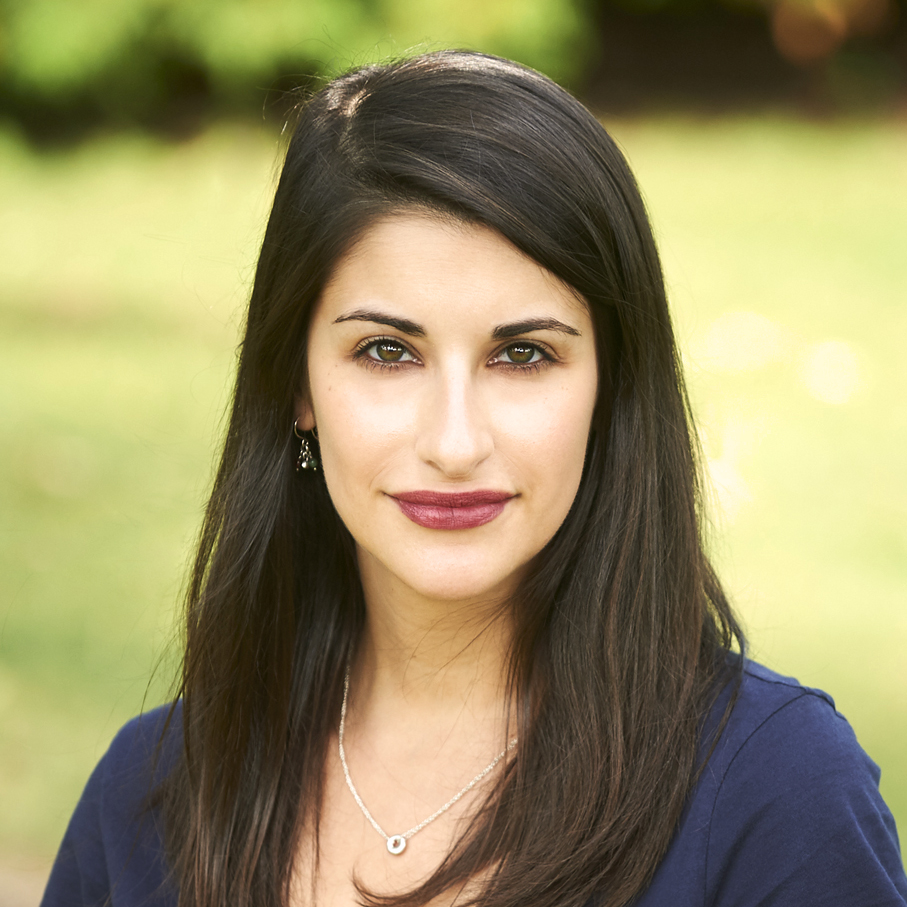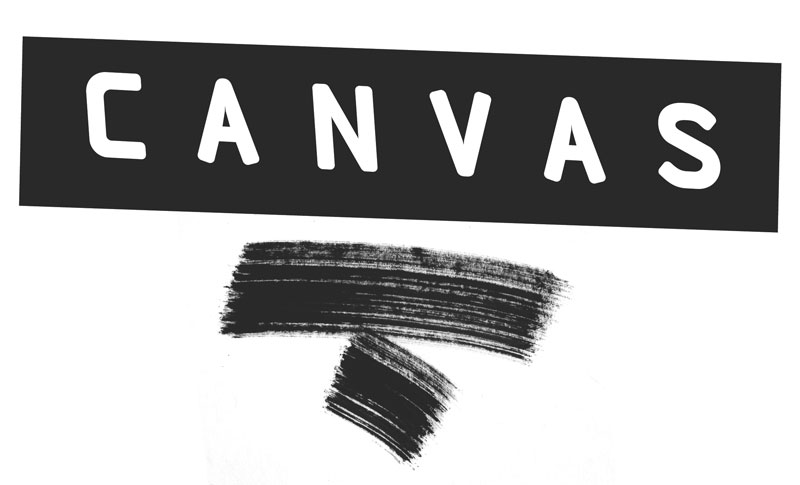David Hoffert has won or been nominated for over a dozen international awards for his work directing and producing feature documentaries and over two hundred episodes of television. His recent documentary, The Rhapsody will premiere at the Toronto Jewish Film Festival (TJFF) 2022. The Rhapsody tells the story of 99-year-old Holocaust survivor and Polish Canadian composer Leo Spellman through his long-lost music and secret wartime diaries. We caught up with him to learn more about making the film and what he’s excited to see at TJFF 2022.
Kultura Collective: Hi David. Can you tell us a bit about you, and your work as a director, producer, and filmmaker?
David Hoffert: I am a producer, director, editor, writer, composer, and animator of feature documentaries and several hundred episodes of television. I sometimes wonder what would happen if I spent my career only doing one thing, but I guess that’s not my style.
Highlights include directing the NFB documentary OCD: The War Inside; producing Magical Imperfection, about the renowned architect Raymond Moriyama; producing The Transgender Project; and directing episodes of Canada Sings, American Mystery, Yukon Gold, Style by Jury, Party Mamas and Designer Guys.

KC: Your film The Rhapsody will premiere at the Toronto Jewish Film Festival (TJFF) 2022. Can you tell us a bit about the film?
DH: The Rhapsody tells the astonishing story of Polish Canadian composer Leo Spellman, whose long-lost musical masterpiece and secret wartime diary provide the framework for a remarkable journey towards artistic liberation at the age of ninety-nine. Spellman had spent eighteen harrowing months in hiding to survive the Holocaust and his diaries, found after he passed away, are among the most revealing documents of their kind from World War II. The film features interviews with Spellman and family, diary animation narrated by Stephen Fry, orchestral performances of Spellman’s music, and an uplifting finale in the Polish town where Spellman narrowly escaped death.
The film took more than ten years to make, starting as a simple story about a CD recording, morphing into a concert film, then taking a major leap when his diaries were discovered and subsequently translated over several years. It has been a labour of love and I am proud to finally bring it to an audience.
KC: What inspired you to produce and direct The Rhapsody?
DH: My father, Paul Hoffert, is a well-known musician and composer, having co-founded the band Lighthouse and too many other accomplishments to list here. One day, out of the blue, he received a phone call from a ninety-eight-year-old stranger named Leo Spellman, asking if he would be interested in producing a CD of his composition Rhapsody 1939 – 1945. Leo had written the piece in a Displaced Persons camp in Germany in 1947 after surviving the Holocaust. It was performed once, put in the bottom of a trunk, and completely forgotten for the next fifty years as Leo carved out a new life in Toronto.
For six months, Leo would come over to their house and they would work on revising the arrangement and preparing the recording. Leo was a real character – funny, personable, and still a great pianist at almost one hundred years old. As time went on, Leo would tell gripping stories about his years surviving the Holocaust, including digging a hole for his sister to hide in during the Liquidation and being hidden for eighteen months by a Polish Christian.
My mother Brenda and I quickly realized this was an incredible story and would make a great documentary. We had previously worked together when she was a producer of the NFB documentary I directed, OCD: The War Inside. With the help of my film friends, we just started shooting the CD rehearsals and recording and before long a project was born.
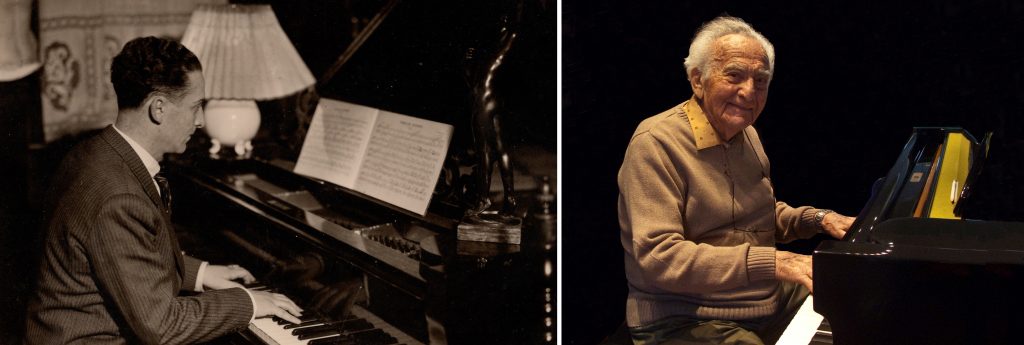
KC: The film interweaves interviews, personal narratives, and gestural animations with Spellman’s compelling score, as played by a string orchestra. Did the artistry of the music drive the storytelling?
DH: At first the documentary was all about the music, and at its heart it still is. Leo was born into a musical dynasty that includes first cousin Wladyslaw Szpilman (portrayed by Adrian Brody in Polanski’s The Pianist). Although Leo had a very successful Toronto dance band during the 1950’s and 60’s, playing numerous weddings and Bar Mitzvahs, he had to put aside his artistic compositions in order to make a living.
The original idea for the documentary was solely about the resurrection and CD recording of The Rhapsody, which was written to musically depict his experiences during the war. The Rhapsody is divided into three sections – Battle, Suffering and Liberation – so the framework for the story was right there in the composition. The music itself remains the driving force of the film, as we see it grow from an arrangement in progress, to a rehearsal, to a recording, to a triumphant orchestral performance.
KC: Please tell us more about the animation – it is beautiful!
DH: When the diaries were found, which focuses on the eighteen months Leo was in hiding, we made the decision to animate these wartime sequences and intersperse them throughout the film. I had enough on my plate with this film as director, producer, writer, editor and sometimes cameraman, but I am also an artist, so I laid out the rough storyboards and used them as a template for the editing.
At the time I had no intention of animating the film myself, so we met with Academy Award winner Chris Landreth, who had beautifully animated the short film Ryan, among others. Chris provided us some guidance and wise words and hooked us up with some young talented students at Seneca College. Over a summer we tried out various styles in search of the look for the film. Several of these illustrations made it into the finished film. We also met with some animators in Poland who provided a few wonderful segments.
But in the end, I ended up doing most of the illustrations and animation myself. In general, the animation starts out in a more realistic style and slowly becomes more abstract towards the end of the war, mirroring Leo’s mental state as he finds himself on the verge of starvation and at the edge of his sanity.

KC: As the population of Holocaust survivors ages, it’s becoming increasingly important to capture their stories. What do you hope viewers will take away from watching Rhapsody?
DH: One of the most moving experiences I had over the course of filming was being invited to the 70th anniversary of the liberation of Auschwitz at the camp itself, with almost 300 Auschwitz survivors present, as well as several presidents, prime ministers, and Steven Spielberg. It was painfully obvious that there will never again be a gathering of that magnitude, as the number of survivors is dwindling with each passing year.
As we have been recently finishing up our film, we were struck by the parallels to this story that continue to go on around the world, particularly the current situation in Ukraine with millions being displaced and fleeing their homes. It is imperative that these stories of inhumanity continue to be told – the Holocaust, Ukraine, Canadian residential schools, and so many more, so that we can try to learn from the indignities of the past and present in order not to repeat it.
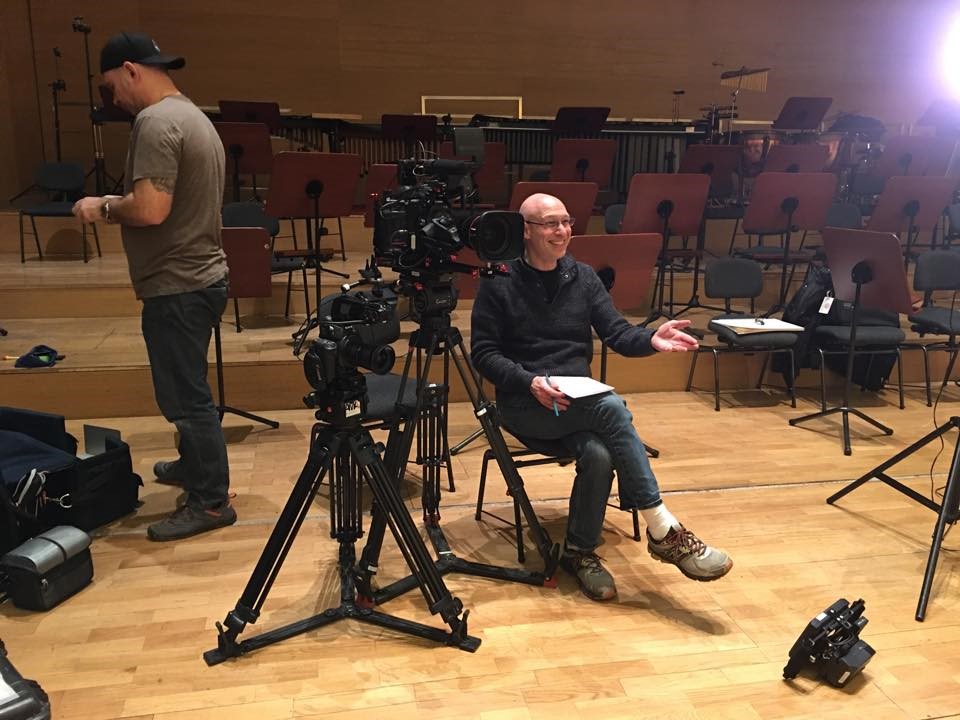
KC: What did you personally learn after working on this film off and on over ten years?
It is important to note that I did not set out to make a Jewish story. I set out to make the story of an artist. The fact that Leo was Jewish, and I am Jewish was incidental. As a documentarian I would certainly have been drawn to this kind of human story had he been Muslim, Christian or none of the above.
But I never realized until well into filming that Leo grew up and was in hiding in a Polish town just an hour’s drive from where my own grandfather Sol grew up. Sol and his brothers got out of Europe before the war started – he knew things were serious when he attended one of Hitler’s rallies to see what it was all about. When I went to Poland to film this documentary I got to go to my grandfather’s town of Rzeszow and actually found the apartment he grew up in. The next day we went to the archives and found for the first time written documents with the names of my relatives – the Hofferts who had died during the Holocaust. Suddenly my film had become personal. I have worked on dozens of projects throughout my career, but this is the one that has left the deepest mark.
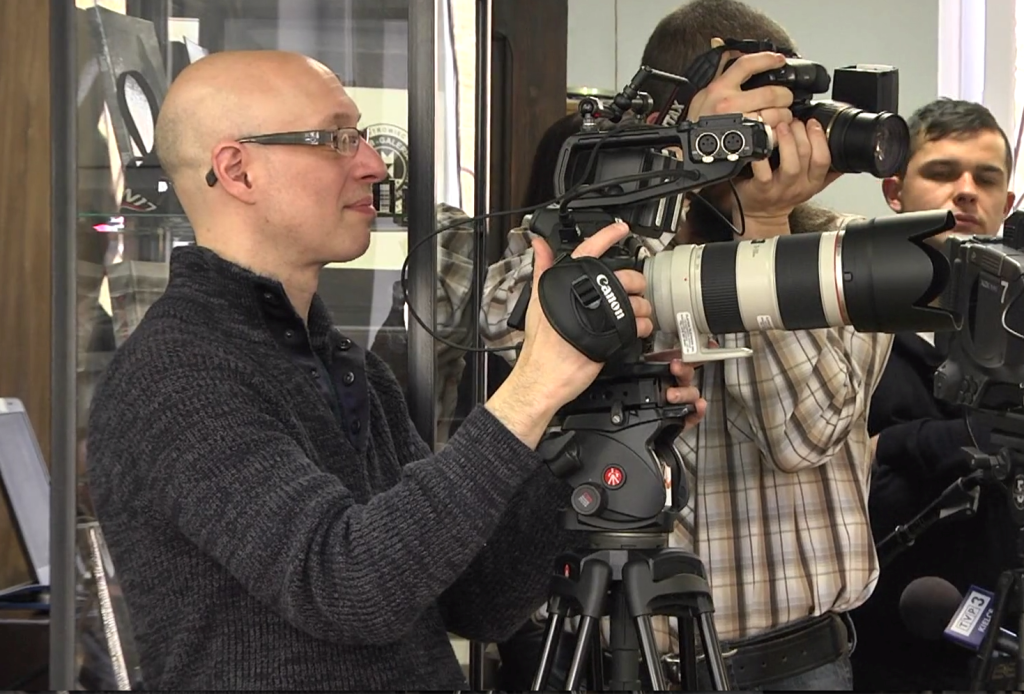
KC: Rhapsody was in post-production during the pandemic. Has the pandemic changed the way you think about filmmaking?
DH: The only positive was that the pandemic allowed me the time to concentrate on working on the animation, alone in my room on the computer. Beyond that, over the last two years I have done a lot of work in editing, colour correct, sound mix, distribution meetings and many other areas over Zoom or similar platforms – and I expect that will continue to be a big part of the industry.
KC: TJFF 2022 will be a hybrid model with screening in theatres, outdoors and online. What does a return to seeing films in a theatre mean to you?
DH: Last year I produced a documentary that I am very proud of – Magical Imperfection, which tells the inspirational story of world-renowned Canadian architect Raymond Moriyama. Moriyama’s acclaimed architectural achievements, including the Ontario Science Centre and the Ottawa War Museum, draw upon his life experiences, including the trauma of wartime internment as a Japanese Canadian.
I was pleased to have the film shown in film festivals around the world, including Portugal, Argentina, Milan, Mexico, Australia and many more. Except all the festivals were virtual and I missed out on the experience of seeing my film with an audience. I am excited to have The Rhapsody screening at the Hot Docs Ted Rogers Cinema on June 15.
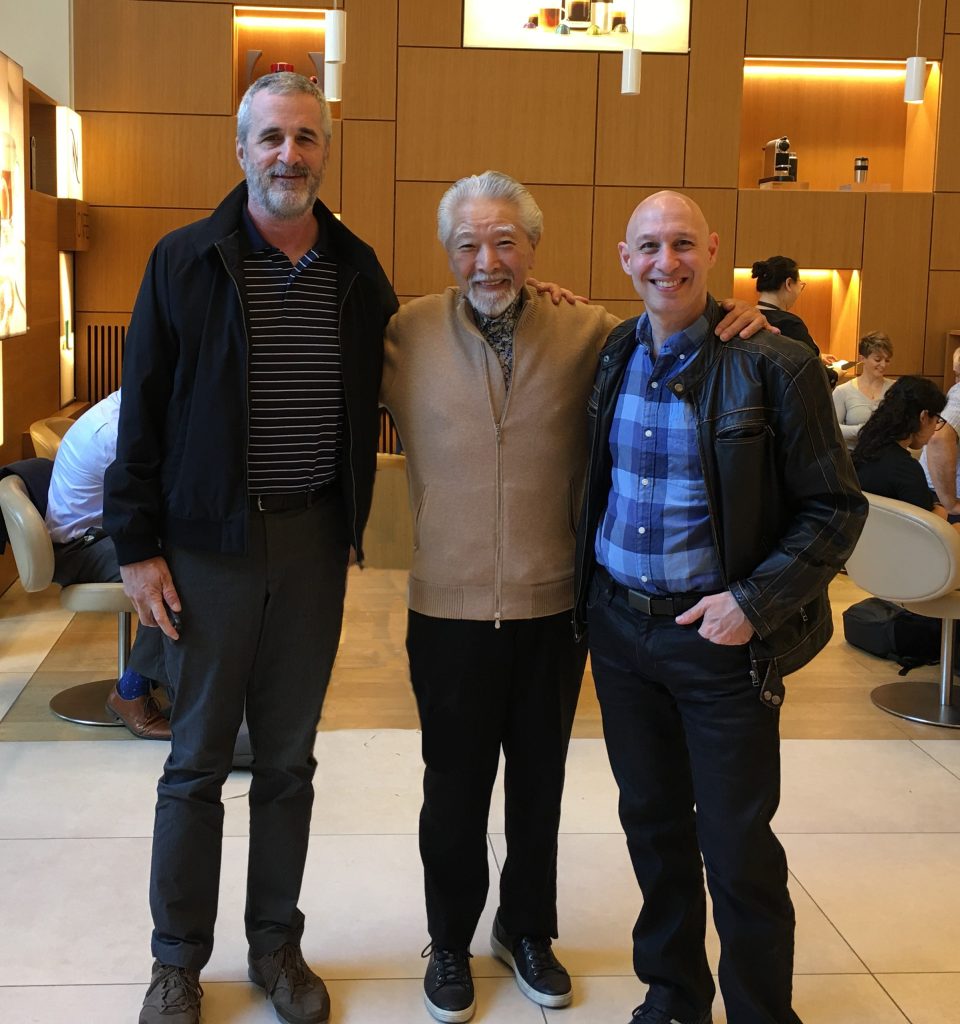
KC: What films are you most excited to see at TJFF 2022?
DH: It looks like TJFF has a great line-up this year. Films that have caught my attention so far include Let It Be Morning, Neighbours, and Jews of the Wild West
KC: You have an amazing resume with a lot of variety! You were nominated for a Gemini Award for Best Direction in a Reality TV Series. Does working in Reality TV inform your work in documentary production, or visa versa?
DH: I approach every project, regardless of format, genre, budget or subject, with the same goal of telling the best story I can. The main difference is that I am a big fan of documentaries, and I almost never watch Reality TV. Nonetheless, regardless of what I am filming, my experience as a director is always enriched by the wide variety of people I get to film – rich and poor, all nationalities and religions, geniuses, artists, crazies and ordinary people. If I can capture their stories and personality on film and tell their stories I have done my job.

KC: Please tell us about producing the first recordings for the Beastie Boys!
DH: I studied film at New York University in the early 1980’s (okay, I’m really dating myself now!) During that time, my cousin Eric and I bought a four-track cassette recorder and we were recording music in our dorm room all the time. Eric had been the lead guitarist in a popular NY power pop band called The Speedies, and young Adam Yauch and Mike Diamond were fans. They contacted us and we went down to their loft and produced the first recordings of their new hardcore punk band The Beastie Boys. We thought they were great, and the songs got local airplay and were eventually released, but no one could have predicted they would go on to reach such heights.
On a side note, two floors up from me, Rick Rubin started Def Jam Records out of his dorm room. We were friends and occasionally saw shows together, like early performances of Run DMC. Rick went on to become one of the most legendary producers ever…but I produced the Beastie Boys before he did!
KC: What else are you working on right now?
DH: I’m taking a break from directing and producing my own projects, and I am editing a fun docuseries called We Bought A Funeral Home, about a quirky family who move from Toronto to small town Dresden, Ontario where they buy and renovate an old funeral home mansion and turn it into their family house. I’m working with some old friends, which is great. As always, I am keeping an eye out for the next great documentary subject.
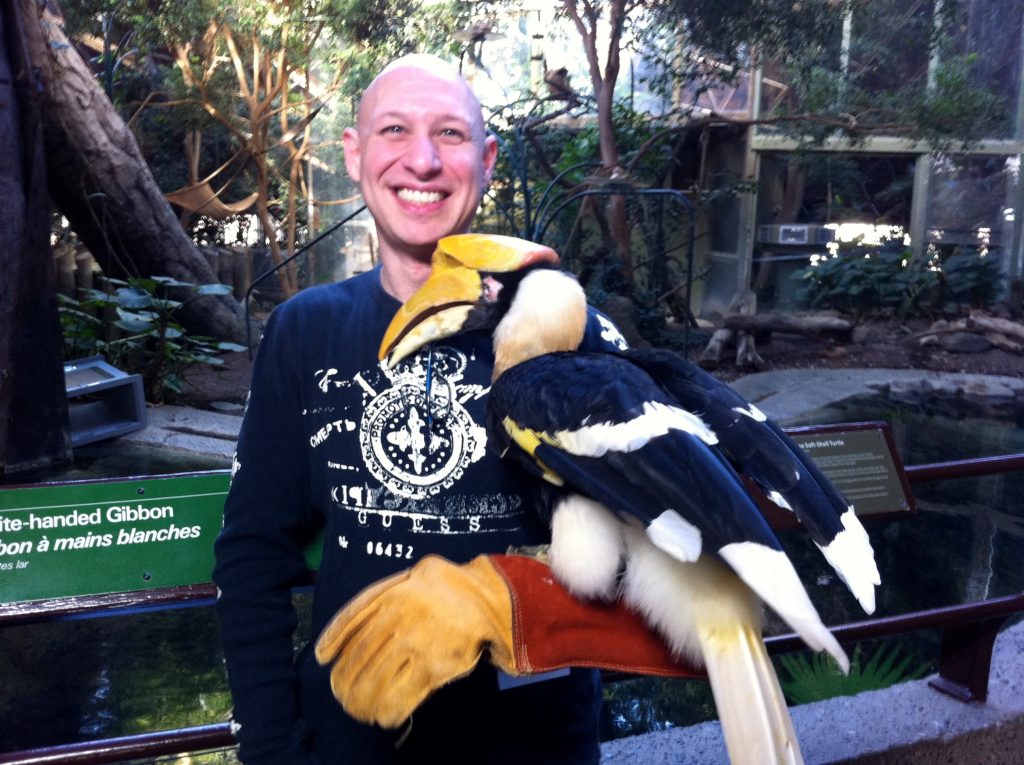
KC: If you could have Shabbat dinner with anyone, who would it be and why?
DH: I would have liked to have had Shabbat dinner with the late Jack Kirby, who created the majority of the Marvel Universe along with Stan Lee, including The X-Men, The Fantastic Four, all of the Avengers and dozens more. Unlike the bombastic Stan Lee, Jack was a quiet, unassuming cigar smoking man who wouldn’t stand out at a bris. Yet his almost limitless imagination created an empire worth billions of dollars, for which he was paid about $50 a page with no royalties.
KC: Lightning round question!
- Poppy vs sesame seed bagels? Depends on my mood. Also depending on my mood – Gryfe’s vs. Montreal bagels.
- Purim vs Passover? Our family has always been into Passover, hosting up to twenty friends and relatives each night (they don’t always have to be Jewish). My parents recently put together a Hoffert family Haggadah which was used for a virtual seder this year at Congregation Habonim!
- Schmaltz herring vs gefilte fish? I like both, but my Chinese wife from Taiwan is not a fan of either. We grew up with different comfort foods…although she makes perfect matzah balls!
David Hoffert has won or been nominated for over a dozen international awards for his work directing and producing feature documentaries and over two hundred episodes of television. Documentary highlights include producing and directing The Rhapsody, about a 99-year-old Holocaust survivor whose story is told through his long-lost music and secret wartime diaries; directing the NFB film OCD: The War Inside; producing Magical Imperfection, about the renowned architect Raymond Moriyama; and producing The Transgender Project. Hoffert’s many television directing credits include Canada Sings, American Mystery, Yukon Gold, Style by Jury, Party Mamas and Designer Guys. In addition, Hoffert created the travel adventure web series Where 2 Next, edited a hundred episodes of television, composed musical scores for TV and theatrical productions, and produced the first recordings of the Beastie Boys. Learn more at davidhoffert.weebly.com
The Rhapsody is the astonishing story of composer Leo Spellman (born Leon Szpilman), a Polish Holocaust survivor who sets out on a riveting and emotional journey towards artistic liberation at the age of ninety-eight. The film features a musical masterpiece lost for more than fifty years; the revelation of a secret wartime diary narrated by Stephen Fry; a harrowing tale of survival told through animation; powerful live concert performances by orchestras in North America and Europe; and an uplifting finale as Spellman’s legacy is finally recognized in the town where he so narrowly escaped death. Learn more at spellmansrhapsody.com
The Rhapsody will be screened on June 15 at 7:30 PM at the Ted Rogers Hot Docs Cinema. It will also be available online from June 16-26 on the TJFF virtual Cinema. Click here to get your ticket!
The 30th Toronto Jewish Film Festival runs from June 9 to 15 (In-Theatre) and June 16 to 26 (Online). TJFF 2022 features the best in Jewish-content film from Canada and around the world including International, Canadian and Toronto Premieres: Dramas, Comedies, Documentaries, Archival films, Short films, and more! TJFF produces programming and projects offering the best feature films, documentaries and shorts from Canada and around the world, on themes of Jewish culture and identity. Learn more at tjff.com





